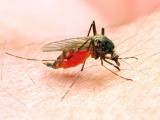Dec 28, 2007 (CIDRAP News) – A health official in Uganda said yesterday that the Ebola outbreak in the western part of the country is receding, though it's too soon to say the disease has been contained, according to media reports.
Sam Okware, chairman of the National Task force for Ebola, said there have been no deaths over the past 4 days and that only one patient remains in an isolation ward, according to an Agence France-Presse (AFP) report yesterday. He said health authorities in the affected areas will wait until Jan 12 to determine if the Ebola outbreak has been contained.
The outbreak, which was focused in five subcounties in Bundibugyo district, involved a new subtype of the virus, according to previous reports from the World Health Organization (WHO). Previously, only four Ebola subtypes had been identified: Zaire, Sudan, Cote d'Ivoire, and Reston.
A Dec 24 statement from Uganda's health ministry said the Ebola outbreak has killed 36 of 135 patients who were infected with the virus, reported Xinhua, China's state news agency, yesterday.
According to the WHO's most recent report on the outbreak, dated Dec 7, the outbreak killed four healthcare workers and the new Ebola virus subtype has been confirmed in nine of the patients. Experts from the US Centers for Disease Control and Prevention (CDC) have been helping the Uganda Virus Research Institute diagnose and analyze samples, the WHO report said.
Isolation wards were established at hospitals in Kikyo and Bundibugyo, where staff members have received additional training in appropriate triage and infection control measures as well as peer and social support, the WHO reported. Field agencies, including UNICEF, Medecins Sans Frontieres, and the WHO are in the area to assist with logistics and provide medications and personal protective equipment. The International Federation of Red Cross and Red Crescent Societies has been conducting intensive communications activities, such as radio broadcasts and mobile film vans, to reach at-risk communities, the WHO report said.
Ecological studies of the new Ebola species are being planned, according to the WHO.
Melville George, a WHO representative in Uganda, said the presentation of the new Ebola strain was atypical, according to a news report in the Dec 22 issue of The Lancet. "The initial symptoms are very similar to malaria," he told the journal.
Unusual symptoms of the new strain may have delayed confirmation of the outbreak, The Lancet reported. Doctors said lack of external bleeding in early cases didn't suggest the presence of Ebola illness. Back in August, Uganda's health ministry originally attributed deaths of 15 family members to anthrax, and Tom Ksiazek, head of CDC's special pathogens branch told The Lancet that because of delays, samples weren't sent to the CDC for testing until Nov 26. Though the CDC confirmed the positive samples 3 days later, the virus may have already been circulating for months, the report said.
The spread of the disease caused panic among some Ugandan communities, and some patients fled isolation units in favor of traditional remedies, The Lancet reported.
"The biggest challenge is the management of fear and rumors," Okware told the journal.
See also:
Dec 6 CIDRAP News story "Suspected cases rise as new Ebola strain stalks Uganda"
Nov 30 WHO statement on Uganda's Ebola outbreak
http://www.who.int/csr/don/2007_11_30a/en/index.html
Dec 7 WHO statement on Uganda's Ebola outbreak
http://www.who.int/csr/don/2007_12_07/en/index.html



















